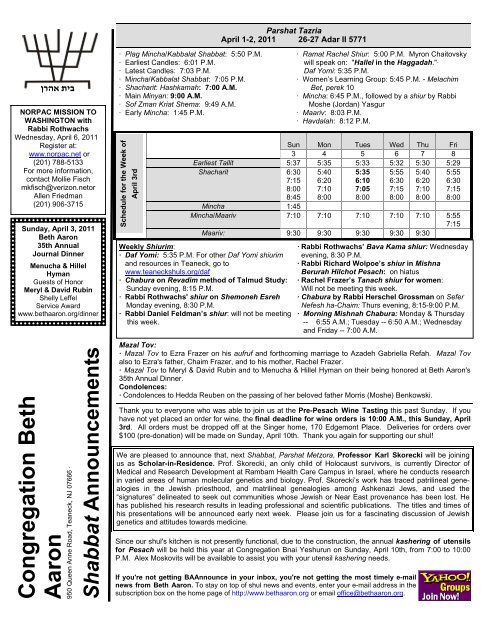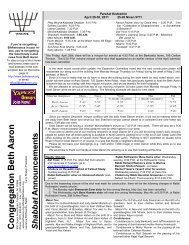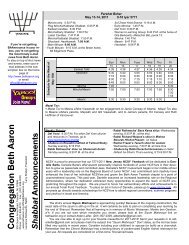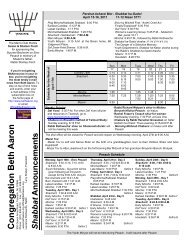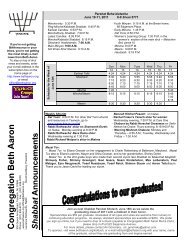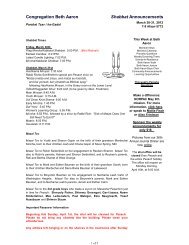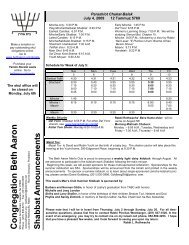Tazria - Congregation Beth Aaron
Tazria - Congregation Beth Aaron
Tazria - Congregation Beth Aaron
Create successful ePaper yourself
Turn your PDF publications into a flip-book with our unique Google optimized e-Paper software.
ןרהא תיב<br />
NORPAC MISSION TO<br />
WASHINGTON with<br />
Rabbi Rothwachs<br />
Wednesday, April 6, 2011<br />
Register at:<br />
www.norpac.net or<br />
(201) 788-5133<br />
For more information,<br />
contact Mollie Fisch<br />
mkfisch@verizon.netor<br />
Allen Friedman<br />
(201) 906-3715<br />
Sunday, April 3, 2011<br />
<strong>Beth</strong> <strong>Aaron</strong><br />
35th Annual<br />
Journal Dinner<br />
Menucha & Hillel<br />
Hyman<br />
Guests of Honor<br />
Meryl & David Rubin<br />
Shelly Leffel<br />
Service Award<br />
www.bethaaron.org/dinner<br />
<strong>Congregation</strong> <strong>Beth</strong><br />
<strong>Aaron</strong><br />
950 Queen Anne Road, Teaneck, NJ 07666 ·<br />
Shabbat Announcements<br />
· Plag Mincha/Kabbalat Shabbat: 5:50 P.M.<br />
· Earliest Candles: 6:01 P.M.<br />
· Latest Candles: 7:03 P.M.<br />
· Mincha/Kabbalat Shabbat: 7:05 P.M.<br />
· Shacharit: Hashkamah: 7:00 A.M.<br />
· Main Minyan: 9:00 A.M.<br />
· Sof Zman Kriat Shema: 9:49 A.M.<br />
· Early Mincha: 1:45 P.M.<br />
Schedule for the Week of<br />
April 3rd<br />
Weekly Shiurim:<br />
· Daf Yomi: 5:35 P.M. For other Daf Yomi shiurim<br />
and resources in Teaneck, go to<br />
www.teaneckshuls.org/daf<br />
· Chabura on Revadim method of Talmud Study:<br />
Sunday evening, 8:15 P.M.<br />
· Rabbi Rothwachs' shiur on Shemoneh Esreh<br />
Monday evening, 8:30 P.M.<br />
· Rabbi Daniel Feldman’s shiur: will not be meeting<br />
this week.<br />
Parshat <strong>Tazria</strong><br />
April 1-2, 2011 26-27 Adar II 5771<br />
· Ramat Rachel Shiur: 5:00 P.M. Myron Chaitovsky<br />
will speak on: "Hallel in the Haggadah."·<br />
Daf Yomi: 5:35 P.M.<br />
· Women’s Learning Group: 5:45 P.M. - Melachim<br />
Bet, perek 10<br />
· Mincha: 6:45 P.M., followed by a shiur by Rabbi<br />
Moshe (Jordan) Yasgur<br />
· Maariv: 8:03 P.M.<br />
· Havdalah: 8:12 P.M.<br />
Sun Mon Tues Wed Thu Fri<br />
3 4 5 6 7 8<br />
Earliest Tallit 5:37 5:35 5:33 5:32 5:30 5:29<br />
Shacharit<br />
6:30<br />
7:15<br />
8:00<br />
8:45<br />
· Rabbi Rothwachs’ Bava Kama shiur: Wednesday<br />
evening, 8:30 P.M.<br />
· Rabbi Richard Wolpoe’s shiur in Mishna<br />
Berurah Hilchot Pesach: on hiatus<br />
· Rachel Frazer’s Tanach shiur for women:<br />
Will not be meeting this week.<br />
· Chabura by Rabbi Herschel Grossman on Sefer<br />
Nefesh ha-Chaim: Thurs evening, 8:15-9:00 P.M.<br />
· Morning Mishnah Chabura: Monday & Thursday<br />
-- 6:55 A.M.; Tuesday -- 6:50 A.M.; Wednesday<br />
and Friday -- 7:00 A.M.<br />
Mazal Tov:<br />
· Mazal Tov to Ezra Frazer on his aufruf and forthcoming marriage to Azadeh Gabriella Refah. Mazal Tov<br />
also to Ezra's father, Chaim Frazer, and to his mother, Rachel Frazer.<br />
· Mazal Tov to Meryl & David Rubin and to Menucha & Hillel Hyman on their being honored at <strong>Beth</strong> <strong>Aaron</strong>'s<br />
35th Annual Dinner.<br />
Condolences:<br />
· Condolences to Hedda Reuben on the passing of her beloved father Morris (Moshe) Benkowski.<br />
5:40<br />
6:20<br />
7:10<br />
8:00<br />
5:35<br />
6:10<br />
7:05<br />
8:00<br />
5:55<br />
6:30<br />
7:15<br />
8:00<br />
5:40<br />
6:20<br />
7:10<br />
8:00<br />
5:55<br />
6:30<br />
7:15<br />
8:00<br />
Mincha 1:45<br />
Mincha/Maariv 7:10 7:10 7:10 7:10 7:10 5:55<br />
7:15<br />
Maariv: 9:30 9:30 9:30 9:30 9:30<br />
Thank you to everyone who was able to join us at the Pre-Pesach Wine Tasting this past Sunday. If you<br />
have not yet placed an order for wine, the final deadline for wine orders is 10:00 A.M., this Sunday, April<br />
3rd. All orders must be dropped off at the Singer home, 170 Edgemont Place. Deliveries for orders over<br />
$100 (pre-donation) will be made on Sunday, April 10th. Thank you again for supporting our shul!<br />
We are pleased to announce that, next Shabbat, Parshat Metzora, Professor Karl Skorecki will be joining<br />
us as Scholar-in-Residence. Prof. Skorecki, an only child of Holocaust survivors, is currently Director of<br />
Medical and Research Development at Rambam Health Care Campus in Israel, where he conducts research<br />
in varied areas of human molecular genetics and biology. Prof. Skorecki’s work has traced patrilineal genealogies<br />
in the Jewish priesthood, and matrilineal genealogies among Ashkenazi Jews, and used the<br />
“signatures” delineated to seek out communities whose Jewish or Near East provenance has been lost. He<br />
has published his research results in leading professional and scientific publications. The titles and times of<br />
his presentations will be announced early next week. Please join us for a fascinating discussion of Jewish<br />
genetics and attitudes towards medicine.<br />
Since our shul's kitchen is not presently functional, due to the construction, the annual kashering of utensils<br />
for Pesach will be held this year at <strong>Congregation</strong> Bnai Yeshurun on Sunday, April 10th, from 7:00 to 10:00<br />
P.M. Alex Moskovits will be available to assist you with your utensil kashering needs.<br />
If you're not getting BAAnnounce in your inbox, you're not getting the most timely e-mail<br />
news from <strong>Beth</strong> <strong>Aaron</strong>. To stay on top of shul news and events, enter your e-mail address in the<br />
subscription box on the home page of http://www.bethaaron.org or email office@bethaaron.org.
Page 2 SHABBAT ANNOUNCEMENTS<br />
Miscellaneous Shul Announcements<br />
The Ramat Rachel Shiur series in memory of Rochi Lerner a"h continues this week (Shabbat HaChodesh) at 5:00 P.M., with a shiur<br />
delivered by Myron Chaitovsky on the topic of "Hallel in the Hagadda". All are invited to attend.<br />
On Tuesday evening, May 17th, Sisterhood will be having its Spring Supperette. We will be honoring two of our dedicated members,<br />
Ellen Gertler and Sari Samuel, and will be treated to an extraordinary evening with good food and friends as we enjoy a presentation<br />
by the entertaining and humorous Challah Maven of New York, Devorah Heller. More information will be available soon!<br />
Shmura Matza Sale pickup will be on Sunday, April 10th, from 12:00 noon to 4:00 P.M., at the home of Barbara Yaros, 910 Prince<br />
Street.<br />
We are pleased to announce our annual Pesach Hospitality Program. If you or someone you know would like to be invited for a<br />
seder or any other Pesach holiday meal (including Shabbat Chol ha-Mo'ed), or would like to host a person or family, please contact<br />
Joshua Zakheim, jhz_is@yahoo.com, with name(s), date(s), number of people and whether or not you eat gebrochs.<br />
Mitzvah opportunity - We are looking for women to volunteer occasionally to drive to New York City to help shul members get to and<br />
from doctor appointments. The driving is not on a regular basis but as needed. If you are able to help out, please contact Susie Atlas,<br />
(201) 801-0378, or <strong>Beth</strong> Evans, (201) 836-4236.<br />
With Pesach just a few weeks away, preparations for the chag are well under way. The chametz sale form is available in the shul<br />
lobby and will remain available throughout the coming weeks. For your added convenience, the form will be available for download<br />
from the shul's website www.bethaaron.org. Please note the times I will be available in the shul office to arrange to serve as your<br />
agent for the selling of your chametz.<br />
MONDAY 4/4 9:15 – 10:30 P.M. (Please note that I will NOT be available earlier that evening, despite having indicated otherwise on<br />
the calendar)<br />
THURSDAY 4/7 7:45 – 10:00 P.M. SUNDAY 4/10 7:00 – 9:45 A.M .<br />
SUNDAY 4/10 8:30 – 10:30 P.M. MONDAY 4/11 9:00 – 11:00 P.M. SUNDAY 4/17 7:00 – 9:45 A.M .<br />
The Sheli Residence is looking for families who can host the young men who live at this residence for meals<br />
on Shabbosim. There will be five young men and one counselor. For more information, contact Shlomo<br />
Kertzner, skertzner@sinaischools.org, (201) 926-1524.<br />
<strong>Beth</strong> <strong>Aaron</strong> Youth:<br />
• All second through fifth graders are welcome to join us this week for Tefillah and Shoko. From 9:20 to 9:30 A.M. on Shabbat, enjoy<br />
cookies and chocolate milk while learning about the Shabbat tefillot.<br />
• For more information on youth activities, contact Erica and Jason David, bethaaronyouth@yahoo.com, (732) 618-9473.<br />
• The learning group for 2nd grade boys will meet this Shabbat, April 2, from 4:30 to 5:30 P.M., at the Staum home, 379 Birch<br />
Street. Please bring your own Mishnah (Masechet Megillah). For more information, contact Leah Greengart, leah@greengart.com.<br />
• The learning group for 2nd grade girls will meet this Shabbat, April 2nd, at 5:00 P.M., at the Knapp home, 258 Cherry Lane.<br />
Please bring your own Sefer Ha-Chinuch. For more information, please contact Rebecca Kurz at rkurz1@yahoo.com.<br />
• The learning group for 5th grade boys will meet this Shabbat, April 2nd, at 5:00 P.M., at the Felsen home, 937 Prince Street.<br />
Please bring your own Mishnah (Masechet Shabbat). For more information, contact Rebecca Kurz, rkurz1@yahoo.com, or Esther<br />
Klavan, eskslp@aol.com.<br />
<strong>Beth</strong> <strong>Aaron</strong> Juniors:<br />
• Registration is now open for Spring Regional, our last Shabbaton of the year. It will take place from Thursday, May 12th to Sunday,<br />
May 15th at Camp Morasha in Lake Como PA. The cost is $150 until April 10th, $175 until April 23rd, and $200 until May 4th. Scholarships<br />
are available. To register, go to www.njncsy.com and click on the Spring Regional link. If you have any questions about registration.<br />
please call Rebecca at the NCSY office, (201) 862-0250. Buses will be leaving from school on Thursday and will be returning<br />
to <strong>Beth</strong> <strong>Aaron</strong> on Sunday afternoon. The cost of bus transportation is $35. If you have any questions about the Shabbaton please<br />
email us at bethaaronjuniors@gmail.com, or you can call Danielle at (201) 247-7961 or Daniel at (908) 414-4235.<br />
<strong>Beth</strong> <strong>Aaron</strong> Teens:<br />
• On Thursday, April 21st (first day of Chol ha-Mo'ed Pesach), <strong>Beth</strong> <strong>Aaron</strong> Teens will be going to Six Flags with NCSY. To purchase<br />
a ticket and reserve a spot on the bus, go to www.njncsy.com.<br />
• If you have any questions, please email us at teens@bethaaron.org.
CONGREGATION BETH AARON .<br />
Community Announcements<br />
CareOne needs volunteers to help make a minyan. On Friday evening, Mincha/Kabbalat Shabbat will be at 7:05 P.M. Shabbat,<br />
Shacharit will be at 9:00 A.M. Mincha will be at 6:55 P.M., shiur on Masechet Ketubot will be at 7:10 P.M. Ma'ariv will be at 8:06 P.M.<br />
On Tuesday, April 12th, at 8:00 P.M., in the beit midrash of The Moriah School, 53 South Woodland Street, Englewood, Rabbi Neil<br />
Winkler will present a pre-Pesach lecture entitled "The Haggadah: How to Pass Down and Not Pass Over.” For more information,<br />
or to RSVP, please contact Erik Kessler, ekessler@moriahschool.org.<br />
The Ma’ayanot Chesed Committee is collecting new books and used books in good condition for Reach Out and Read -- an<br />
early childhood literacy program based in the pediatric outpatient clinic of the Mount Sinai Medical Center. Please drop off all book<br />
donations in the box located in the school lobby, 1650 Palisade Avenue. For more information, please contact Ariella Steinreich,<br />
Community Service Coordinator, SteinreichA@maayanot.org, (201) 833-4307 ext. 233.<br />
Once again, Tomchei Shabbos will be collecting matzot for distribution. Please make it a point over the next few weeks to use<br />
your supermarket free matzah coupons and drop the matzot off on the steps of the side entrance of 421 Churchill Road (northeast<br />
corner of Sussex Road). Tizku le-Matzot -- and thank you from Tomchei Shabbos!<br />
On April 27th, Teaneck residents will vote on Teaneck’s school budget and elect three members to the Teaneck Board of Education.<br />
The Board makes key educational and financial/cost decisions that ultimately impact the quality and reputation of our schools and,<br />
secondarily, our property values and real estate taxes. It is vital that all eligible citizens make their voices heard in these critical decisions.<br />
With Passover ending on Tuesday evening, April 26 th , some families may still be out of town and not able to vote in-person at their<br />
regular polling places. In addition, many of us will be putting our houses back together, and may not have time to vote. As an alternative<br />
to in-person voting, Teaneck residents can exercise their right to vote by applying to receive and then casting absentee ballots.<br />
To receive an absentee ballot, individuals must mail in a request, which must be received by April 19th. The form can be<br />
downloaded from www.co.bergen.nj.us/countyclerk/forms/Vote_By_Mail_Application.pdf The absentee voter must then complete<br />
the ballot form and mail it back to the County Board of Education for receipt no later than Wednesday, April 27th.<br />
QUESTIONS on Parshat <strong>Tazria</strong><br />
1. (a) Why do the laws of childbirth in Parashat <strong>Tazria</strong> follow the laws of kosher and non-kosher animals in Shemini (2 reasons)? (b)<br />
Since the mitzvah of brit mila already is stated in Parashat Lech Lecha, why is it repeated in this parasha (2 reasons)? (c) (1) Why<br />
may a brit mila be performed no earlier than the 8 th day (5 explanations)? (2) For whom may a mila be done before the 8 th day?<br />
(Vayikra 12:2-3)<br />
2. (a) Why is the mother tamei for 7 days after a boy’s birth, but for a girl, 14 days (3 reasons)? (b) Why, for the tuma after a girl’s<br />
birth (verse 5), is she called “nekeiva” (female), while, for the korbanot that the mother brings (verse 6), the girl is called<br />
“bat” (daughter)? (c) Why did the mother, after giving birth, offer (1) an olah? (2) a chatat (2 reasons)? (d) If a woman had triplets, how<br />
many korbanot did she bring? (Vayikra 12:5-6)<br />
3. (a) Why did Hashem transmit the tzara’at laws to Aharon, in addition to Moshe (2 reasons)? (b) What are 10 differences between<br />
the natural disease of leprosy and the Divine tzara’at? (Vayikra 13:1-2)<br />
4. (a) Where in Tanach do we see tzara’at resulting from the sin of: (1) idol worship? (2) immorality? (3) murder? (4) blasphemy? (5)<br />
acting in an improper capacity? (6) swearing a false oath? (7) lashon ha-ra? (b) Since the tzara’at laws are recorded in the Torah following<br />
the kashrut laws, why was tzara’at not a punishment for eating non-kosher food? (c) Why was a metzora expelled from the city<br />
and isolated? (Vayikra 13:3)<br />
5. (a) What was the purpose of tzara’at nega’im (afflictions) on clothing and houses? (b) Why do these nega’im no longer occur (3<br />
reasons)? (c) What punishment substitutes for tzara’at nowadays? (Vayikra 13:47)<br />
6. Why does the Torah state that the new month shall be “lachem” (for you) (2 explanations)? (Shemot 12:2)<br />
7. (a) In the haftara, what are the differences between the korbanot (sacrifices) for Rosh Chodesh described by Yechezkel and those<br />
described in the Torah? (b) What do these differences tell us? (Yechezkel 46:6-7)<br />
Parsha Answers continued from page 4<br />
6. “Lachem” was addressed to (a) Bnei Yisrael, indicating that they will be masters of their own calendar and holidays, unlike when the Mitzrim<br />
controlled their time (Sforno). (b) Moshe and Aharon – just as these leaders had the authority to declare Rosh Chodesh, leaders in future<br />
generations, who had semicha (ordination) bestowed on them going back to Moshe, could declare Rosh Chodesh (Rosh Hashana 25b).<br />
7. (a) In Bamidbar 28:11-12 and in Sefer Yechezkel, the korbanot for Rosh Chodesh were: (1) Bamidbar – two young bulls; Yechezkel – one<br />
young bull; (2) Bamidbar and Yechezkel – one ram, (3) Bamidbar – 7 lambs; Yechezkel – 6 lambs; (4) Bamidbar – 3/10 of an ephah mealoffering<br />
for each bull; Yechezkel – an ephah meal-offering for the bull; (5) Bamidbar – 2/10 of an ephah meal-offering for the ram; Yechezkel –<br />
an ephah meal offering for the ram; and (6) Bamidbar – 1/10 of an ephah meal-offering for each lamb; Yechezkel – as much as can be afforded<br />
for the lambs; (b) if the kohanim had only one bull or fewer than 7 lambs, as prescribed by the Torah, or if they have meal-offerings for<br />
some, but not all, of the korbanot, they should bring those they have available (Rashi).<br />
Page 3
Learning Opportunities<br />
· The Amud Yomi shiur meets week nights at 9:30 P.M. at Rinat<br />
Yisrael. For more information, contact Mordechai Ungar, (201)<br />
741-3920, m_ungar@yahoo.com.<br />
Motzaei Shabbat<br />
· Rabbi Reisman's satellite Navi shiur: 10:00 P.M. at Keter Torah.<br />
Sunday<br />
· On Sunday, April 4th, Yeshiva University invites you to its<br />
Midreshet Yom Rishon, weekly Sunday morning learning for<br />
women. The program which will be held at the Shenk Shul in the<br />
Schottenstein Center (on West 185th Street, between Audubon and<br />
St. Nicholas Avenues) is open to participants of all ages,<br />
backgrounds, and learning levels. Admission is free, and no<br />
registration is required. This week, Midreshet Yom Rishon will<br />
feature Rabbi Meir Goldwicht and Mrs. Nechama Price. The first<br />
shiur starts at 9:30 A.M.; second shiur starts at 10:30 A.M. For<br />
more information or to download mar’ei mekomot, please visit<br />
www.midreshetyomrishon.org or call (212) 960-0041.<br />
· On Sunday, April 4th, Yeshiva University invites you to its Kollel<br />
Yom Rishon, weekly Sunday morning learning for men. The<br />
program, which will be held in Furst Hall Room 501 (500 West<br />
185th Street, at the corner of Amsterdam Avenue) is open to<br />
participants of all ages, backgrounds, and learning levels.<br />
Admission is free, and no registration is required. This week, Kollel<br />
Yom Rishon will feature Rabbi Dr. Jeffrey Woolf and a joint<br />
presentation by Cantors Bernard Beer and Sherwood Goffin. The<br />
first shiur starts at 9:30 A.M., second shiur starts at 10:30 A.M. For<br />
more information or to download mar’ei mekomot, please visit<br />
www.kollelyomrishon.org or call (212) 960-0041.<br />
· The Chofetz Chaim Women's Learning Group will meet this Sunday,<br />
April 4th, from 9:00 to 10:00 A.M., at the Stobezki home, 1117<br />
Trafalgar Street.<br />
Thursday<br />
· Rabbi Yissocher Frand's weekly shiur will be broadcast at 9:00<br />
P.M. at Keter Torah.<br />
· Each Thursday evening, at 8:30 P.M., at Yeshiva Gedolah, Rabbi<br />
Roberts gives a Parasha Shiur, followed by maariv at 9:30 P.M.<br />
Friday<br />
· The Bergen County Kollel for Baalei Batim meets on Friday<br />
mornings from 8:00 to 9:45 A.M. at the shul. Shiurim include mussar,<br />
gemara and halacha. For more information, call Bob Oppenheimer,<br />
(201) 280-1780 or Hertzel Benji, (201) 261-1453.<br />
· Each Tuesday and Thursday morning, Keter Torah presents Torah<br />
in the AM: 9 to 9:45 A.M. - Navi chavura on Sefer Melachim; 9:45 to<br />
10:45 A.M. - Rabbi Menachem Meier's Talmud shiur on Bava Metzia,<br />
Chapter 5; 10:45 to 11:45 A.M.- Rabbi Meier's shiur on Iyov (Thurs.);<br />
10:50 A.M. to 12 Noon - Rabbi Baum's shiur on Trei Asar (Tues).<br />
Answers to Parsha Questions<br />
1. (a) After discussing the tuma generated by non-kosher animals, the Torah discusses tuma caused by humans – who were created after animals<br />
(Rashi) – beginning with a woman’s tuma at the start of life (ibn Ezra). (2) The Torah teaches that if one is worthy, all was created before him<br />
for his benefit – if he is unworthy, even a gnat and earthworm preceded him (Vayikra Raba). (b) The Torah repeated this mitzvah adjacent to the<br />
korbanot laws to teach that (1) just as korbanot may not be offered at night, a mila may not be performed at night (Ohr ha-Chaim). (2) just as<br />
korbanot were offered on Shabbat, the mila must be performed on the 8 th day, even if that day is Shabbat – it is permissible to do melacha on<br />
Shabbat for it (Chizkuni). (c) (1) (i) Hashem commanded that we wait until the day He knows the boy has enough strength to endure surgery; (ii) a<br />
brit mila is like a korban, bringing the boy under the of the Shechina’s wings – like all korbanot, the baby must live through at least one Shabbat to<br />
elevate his kedusha (holiness) and be fit as a “korban”; (iii) the Torah requires that the mother separate from her husband for 7 days while she is a<br />
nida – it would be wrong to celebrate the brit mila when the parents are sad due to the separation (Ohr ha-Chaim). (iv) The mother’s nida blood,<br />
which is tamei, nourished the child, and it takes 7 days for the baby to eliminate that blood – he is then sufficiently pure to enter into the holy covenant<br />
(Sforno). (v) The Torah teaches that a woman who is scrupulous in observing the 7 days of nida laws will be blessed with sons who will be<br />
circumcised on the 8 th day (Vayikra Raba). (2) For a non-Jewish boy converted to Judaism (Torah Temima).<br />
2. (a) (1) When a boy is born, everyone rejoices, but for a girl, there is a measure of sadness – in deference to the joy, Hashem removes the tuma<br />
for a boy earlier (Nida 31b). (2) At birth, there is a measure of sadness that a mother had endured labor pains – when a boy is born people are<br />
glad that he will not have to endure those pains, but for a girl, there is sadness that she will when she grows up (Maharsha). (3) Since a father is<br />
more responsible to raise his sons, and a mother is more responsible to raise her daughters, her purifying period after childbirth is longer for a girl<br />
(Hirsch). (b) Since, until a baby is 30 days old, there is doubt if it will survive, at birth she is called a “female,” but when the korbanot are offered,<br />
which is past 30 days, this danger has been removed, and she is called a “daughter” (Meshech Chochma). (c) (1) With the olah, the woman thanks<br />
Hashem for rescuing her from the birth pangs and allowing her to survive the childbirth (Sefer ha-Chinuch – Mitzvah 168). (2) (i) The chatat atones<br />
for her possibly swearing, during her labor pains, never again to live with her husband – a vow that she will violate (Nida 31b). (ii) The chatat is<br />
brought as atonement for Chava’s sin, which resulted in downgrading the holiness of childbearing by bringing in the yeitzer ha-ra’s lust (R. Bechaya).<br />
(d) She would still bring only 2 korbanot, as they atone for her, not for the babies (Keritut 9b).<br />
3. (a) (1) Only a kohen was authorized to declare whether an affliction was tzara’at (ibn Ezra). (2) The laws were directed primarily to the kohanim,<br />
rather than to the entire nation (transmitted to them by Moshe), because anyone with tzara’at would rush to rid himself of it, and there was no need<br />
to urge Bnei Yisrael in this regard (Ramban). (b) (1) Leprosy begins with a swelling and darkening of the skin, but tzara’at caused no swelling, and<br />
the skin turned white; (2) Shechin Mitzrayim, the most severe form of leprosy, does not render the person tamei, but tzara’at did; (3) for leprosy,<br />
the appearance of raw flesh in the diseased area indicates an improvement, but for tzara’at, raw flesh indicated that the person is tamei; (4) if the<br />
healthy flesh disappears, it indicates that the leprosy has returned, but if the tzara’at returned, it was a sign of tahara (purity); (5) leprosy is diagnosed<br />
anywhere on the skin as a result of a complete physical exam, but the kohen examined only the skin visible to his eye, not the hidden folds;<br />
(6) before examining a house for tzara’at, the kohen ordered all objects removed, but for a natural disease, potentially infected items would not be<br />
put in a public area; (7) leprosy is examined whenever it occurs to prevent its spread, but no one would be examined for tzara’at on Shabbat or<br />
Yom Tov, when many people gathered in Yerushalayim; (8) leprosy could occur anywhere, but in Yerushalayim, no house could be declared<br />
tamei; (9) lepers have to be isolated, but in open towns that were not walled, a metzora could remain in the town; (10) leprosy could affect anyone,<br />
but a non-Jew could not be declared tamei with tzara’at (Hirsch).<br />
4. (a) (1) The cheit ha-eigel worshippers were stricken with tzara’at; (2) when Pharaoh kidnapped Sarah for immoral purposes, he and his court<br />
were stricken; (3) after Yoav murdered Avnair, David ha-Melech cursed him with tzara’at; (4) when Goliat mocked Hashem, he was stricken; (5)<br />
when King Uziah entered the Beit ha-Mikdash to offer ketoret (incense) that only kohanim may offer, he was stricken; (6) when he falsely swore to<br />
Na’aman that Elisha had sent him, Geichazi and his sons were stricken; (7) when Miriam spoke lashon ha-ra against Moshe, she was stricken<br />
(Vayikra Raba). (b) One is careful about what he puts in his mouth but is lax about what comes out – Hashem brought tzara’at not on one who<br />
devoured pork, but to warn one who “devoured” people with careless evil speech (Y. Salanter). (c) Since, through lashon ha-ra, one separates a<br />
man from his wife and people from their neighbors, the metzora was punished mida ke-neged mida with separation from society (Arachin 15b).<br />
5. (a) Hashem inflicted nega’im on clothing and houses to alert the owner of the clothing or the house to repent his sins, before the tzara’at affected<br />
his body – nega’im showed Hashem’s compassion for Bnei Yisrael’s acceptance of their mission as an am kadosh (holy people); (b) (1)<br />
When Bnei Yisrael were on a high level of kedusha, they were vulnerable to nega’im – when they descended from this plateau, they no longer<br />
were worthy of these reminders from Hashem to repent, and there have been no nega’im for many generations (Sforno). (2) Nega’im were open<br />
miracles that we do not merit today (Ramban). (3) There are no nega’im today since people cannot be cured of them without purification in the Beit<br />
ha-Mikdash (Shalah). (c) Poverty, since (1) both a metzora and a pauper are considered “dead,” and (2) poverty atones for lashon ha-ra (Chofetz<br />
Chaim).<br />
Parsha answers continued on page 3


